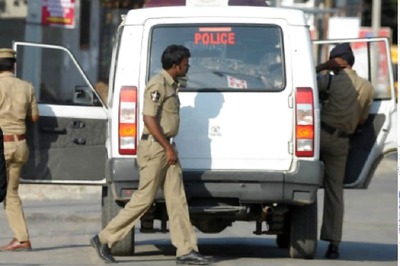
views
New Delhi: With the last few hours to go for the final draft of the National Register of Citizen (NRC) to be published, the Supreme Court-monitored exercise is nearing completion after four years. It is estimated that 3.29 crore people applied to prove their citizenship, submitting in excess of six crore documents as proof for inclusion.
While in two drafts NRC lists more than 2 crore “genuine" Indian citizens have been released so far, 41 lakh people have failed the test of citizenship. Of those excluded, 36 lakh have claimed for inclusion. In the run-up to the publication of final NRC draft on August 31, anxiety over citizenship has peaked in visible forms across multiple communities. More than 30 people are reported to have committed suicide.
News18 revisits the eastern state’s history with illegal immigration and how the NRC exercise has panned out.
Why did the need for 'updation' arise?
With shifting state boundaries and, induced migration every 40 years, Assam’s geography and ethnic composition were constantly redefined against Hindu and Muslim populations of West Bengal and Bangladesh.
There were four significant changes to ‘colonial spatial order’ in Assam that is crucial to understanding why the narrative of illegal immigration on the basis of a demographic change argument, was able to get the NRC updated.
The first being, the incorporation of Assam into Bengal Presidency in 1838. Second, the separation of Assam in 1874 from Bengal as a separate state. Created in 1874, Assam included the predominantly Bengali Muslim Sylhet district of now Bangladesh.
The third change is the 1905 partition of Bengal into a Bengali Hindu province of West Bengal and the predominantly Bengali Muslim province of ‘East Bengal and Assam’. This partition was annulled in 1912 and Assam was reconstituted as a separate province: the fourth change in the border. The Bengali Muslim district of Sylhet and the Bengali Hindu district of Cachar was included in the Assam that was created.
When for the first time in 150 years, on Indian independence, the Assamese came to power in the state, the first instinct for action was local self-preservation, protection and promotion.
The cartographic changes to Assam in addition to illegal immigration had caused its population — comprising mostly Bengali and Muslims — to rise. Updating the NRC was a way to deal with the rising influx of the outsider in Assam.
Close on the heels of the anti-illegal foreigners' movement in Assam in 1980, the All Assam Students’ Union (AASU) and Assam Gana Parishad (AGP) in 1980 had submitted a memorandum to the Centre, seeking the ‘updation’ of the list. The move was aimed at protecting the indigenous culture of Assam from illegal immigrants from Bangladesh.
How is citizenship ascertained in NRC?
There are two ways to register for the NRC. First, submit one document as proof of domicile in Assam from a given list that is issued by the Government of India (GOI) before 24 March 1971. Second, establish a documented relationship or a ‘family tree’ confirming kinship network with an ancestor – by providing supporting evidence – who has a recognised document of Assam domicile issued by the GOI to his/her name before 24 March 1971. The NRC has shifted the constitutional deadline of citizenship in Assam to 24 March 1971 from 19 July 1948.
The NRC recognises these documents: 1951 NRC, electoral rolls upto 24th March 1971, passport, citizenship certificate, birth certificate, educational certificate, etc. Failing to provide any of the above, one would be declared a non-citizen of India.
Why is minority apprehensive of the NRC?
On August 5, a frenzy to attend NRC saw the accident of a bus that was ferrying applicants from semi-rural areas to Guwahati. This happened after the NRC authority sent out emergency notices for hearing to hundreds and thousands of people and asked to appear in court within two days. The collision with an oil tanker caused burn injuries to 30 people —mostly poor Bengalis and Muslims.
After Independence, the ‘Assamese’ saw themselves as a British project run by Bengali influence and culture. The British declaration of Bengali as the official language of Assam in schools and law courts was significant of this. Such Bengali favouritism, and thereby ‘Assamese’ discrimination, built over centuries of English social interaction and cultural socialisation, mounted an ‘Assamese’ resentment.
In effect, in the years soon after Independence, politics in Assam took this turn: Assamese was made the official language of the state, the employment of the ‘sons of the soil’ in the state administrative services became a policy initiative, ‘Assamese’ teachers were appointed in schools while Assamese was pressed as the language of instruction in educational institutions.
With the creation of Bangladesh in 1971 and the illegal immigration of Bengali Muslims from the new state, Bengali and Muslim identities came under further scrutiny as the face of illegal immigration. It is within this historic context of identity formation, that all those whose names are not there in the draft NRC will get another chance at appealing to the NRC authorities.
But those who do not have their names in the final NRC either will be deemed as not a citizen of the country. They will have to fight the battle in the Foreigners Tribunals to prove themselves as Indians.
What happens to those who lose cases at Foreigners Tribunals?
Neither the state nor the Centre has clarified what happens to those who lose their cases in the Foreigners’ Tribunals, whether they will be detained, deported or allowed to stay on without the rights and privileges of citizenship. So far, the focus has been to only include or exclude people in the NRC list.
However, as a precautionary measure, the Assam Police has shared posters across all its social media platforms against the spread of rumours and misinformation. "Every individual left out from the final NRC can appeal to the Foreigners Tribunals (FT)," the post reads.
It adds that every excluded person from the list has 120 days to file his/her appeal in the FTs.
The Assam government has tightened up security in the state with the police giving prohibitory orders under Section 144 CrPC in sensitive areas of the state, while also extensively campaigning against the spread of rumours around the outcome.
"Non-inclusion of a person's name in NRC does not amount to his/her being declared a foreigner," reads a poster by Assam police against misinformation.
ADG of Assam Police, Harmeet Singh told the press that they "are alert to the fact that mischievous elements may try and spread rumours through social media and are keeping an eye."
"This may include legal action, counselling, removal of posts from social media, etc. We have also initiated a sensitisation programme to make people aware of the factual and legal position and the steps being taken by the government to avoid any harassment to the general public," he added.




















Comments
0 comment